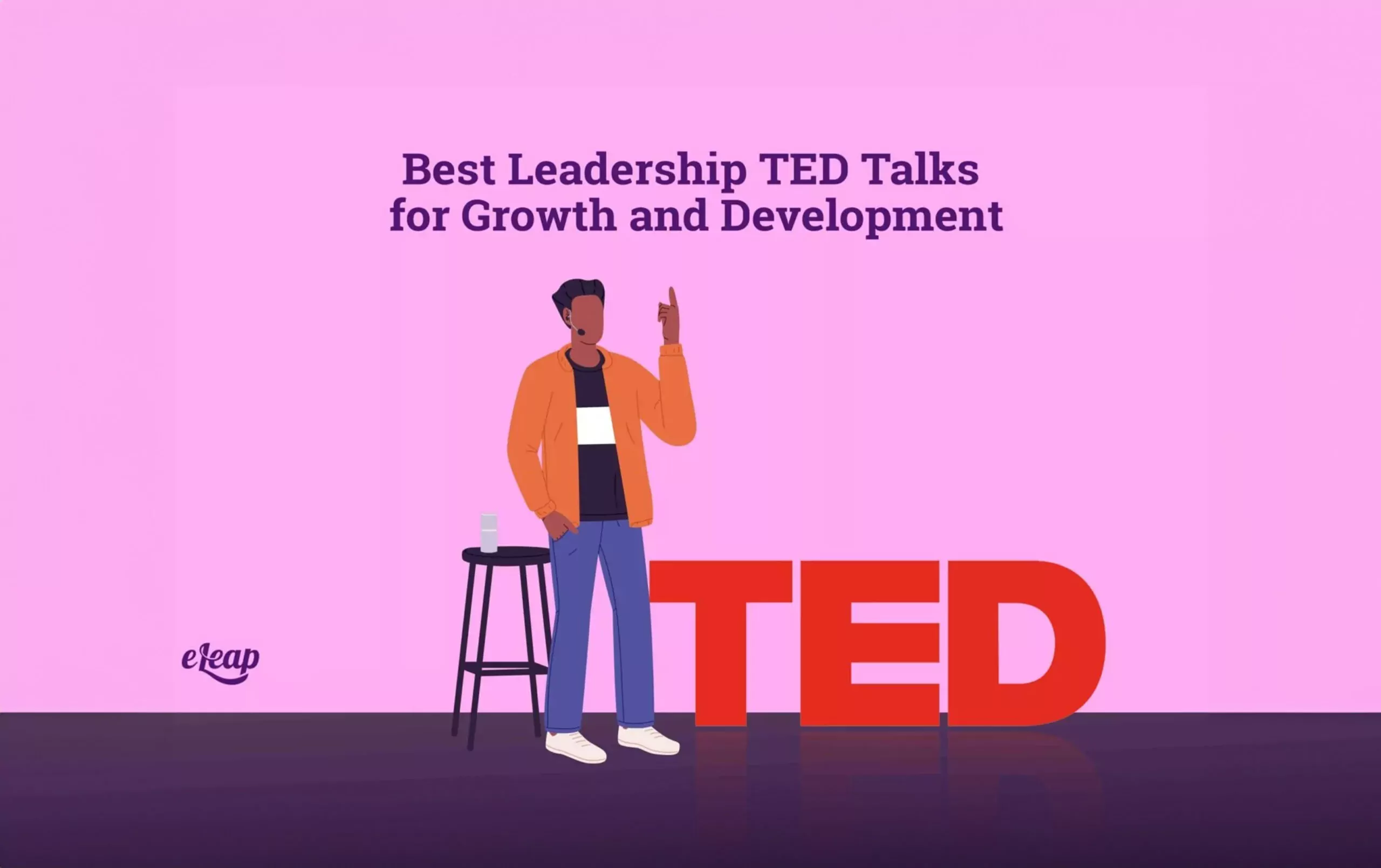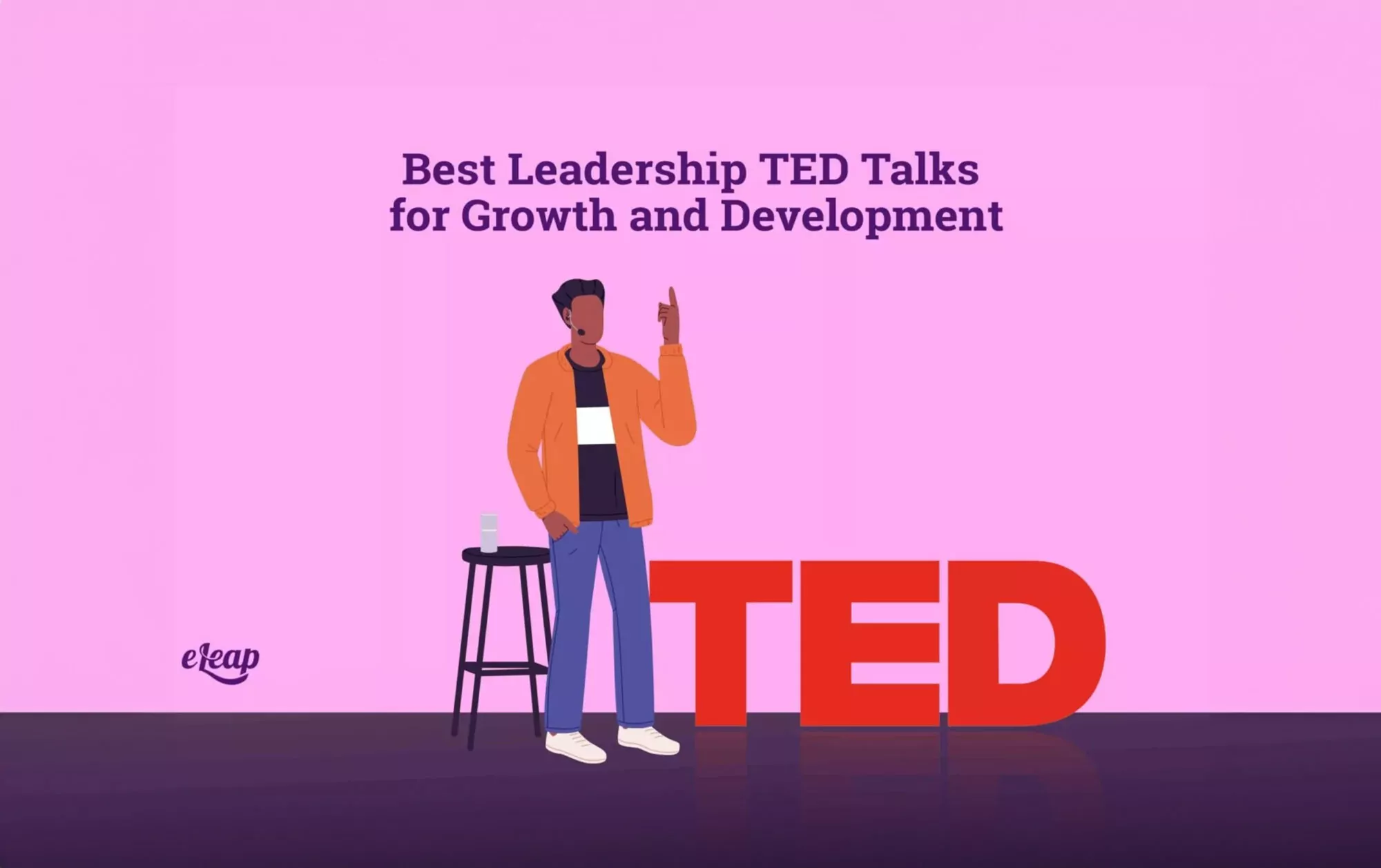Best Leadership TED Talks for Growth and Development

A surefire way to develop your managerial skills today is by listening to the best leadership TED Talks. In case you’ve been living under a rock this last decade or so and don’t know what TED Talks are, here’s a rundown.

TED stands for technology, entertainment, and design. TED is a nonprofit organization that’s mission is to spread ideas through short yet powerful talks. These talks come from average Joes as well as high-ranking people in all industries. Talks are recorded in front of live audiences and are available on multiple platforms, such as the TED website and social media channels.
TED talks are all under 18 minutes long. They can be on any topic, as long as the speech is engaging and charismatic. TED talks deliver new ideas based on concrete evidence. Currently, the TED organization also includes platforms for talks on global issues, education, health, and business topics. These ideas are often applicable to a wide general audience, even as they specify particular topics.
Thus, there are plenty of TED Talks out there to help you develop your leadership skills. Leadership skills aren’t something you can buy. You can’t study a textbook and take a test to say that you’re now an effective leader. Instead, skills are developed and honed through experience, relationships, and (sometimes hard) lessons.
Pick one of the following best leadership TED Talks that you think has a worthy idea. We bet as soon as it’s over, you move on to another one. Yep, they’re that good.
“How to Break Bad Management Habits Before They Reach the Next Generation of Leaders” by Elizabeth Lyle
Some of the best TED Talks give relatable situations that make people laugh at themselves. In this speech, Lyle admits to the fact that she stacks dirty dishes until she can’t put off the task any longer. (Anyone else?) Eventually, though, she stopped questioning herself and just allowed the bad habit to become part of who she was.
Lyle goes on to discuss that bad habits are formed when we don’t stay accountable to ourselves. It’s especially important to prevent bad habits and form good ones during formative periods of our lives, such as:
- Our late teens/early twenties when living independently for the first time
- The first years of a professional career
- The beginning of a relationship or marriage
Bad habits formed in a relationship, career, or home life seep into each of the other areas. As a manager, this hinders professional development and career growth. Furthermore, your learned behavior is picked up by your employees who look up to you and use you as an example for expectations in the workplace.
Every workplace choice and colleague interaction you have shapes the corporate culture, routines, and practices of your workplace. This is overwhelming to some people; however, just remember that you have the power to empower others for growth and development.
Lyle sums up her TED Talk with a quote from Warren Buffet, the iconic investor. “The chains of habit are too light to be felt until they’re too heavy to be broken.” Take your leadership skills into your own hands. Recognize bad habits and make the effort to replace them with good ones.
“Are You a Giver or a Taker?” by Adam Grant
Grant starts off his presentation by stating that there are three types of people in any given workplace:
- Givers – You prioritize others over yourself. You give and give without expecting reciprocation.
- Takers – The most important person in your circle is you. Your focus is on what you gain from every interaction, conversation, or relationship.
- Matchers – You believe in equality; give and take should be a back-and-forth in which the scales come out even every time.
Which are you? What types of people make up your workplace? Grant’s surveys showed that the majority of people are matchers. This seems like good news, as it’s easy to see the negative possibilities of givers and takers.
However, it’s not so simple. In reality, givers are the best and the worst of the bunch, depending on the way they use their skills. Givers who allow themselves to be exploited live with stress and anxiety, and then burn out. Alternatively, those who are selfless with strong leadership skills rise to the top quickly.
“Why the Secret to Success Is Setting the Right Goals” by John Doerr
Doerr teaches leaders why goal setting is a strong foundation for a successful business. Sometimes, companies fail because of poor ethics or structure. However, oftentimes it’s because they don’t have a straightforward or well-placed vision.
How do you set effective goals? Doerr suggests that concentrating on “objectives and key results” (OKRs) keeps businesses on the right track. The OKR system asks:
- “Where do you want to go?”
- “How are you going to get there?”
To answer these questions, company leaders do well to collaborate and ensure that all team members are aligned with the shared vision. This helps even very lofty goals become not only achievable but easy.
Some leaders don’t even prioritize goal-setting to begin with! If this is you, start by asking yourself what your ‘why’ is. Figure out your purpose and how it meshes with your business. Decide what your business’s purpose is and where your individual passions connect.
“What Are You Willing to Give Up to Change the Way We Work?” by Martin Danoesastro
As a transformation expert, Danoesastro uses the TED platform to teach about the value of small, autonomous teams. He uses the example of a flock of birds in a flying ‘v’ formation. Each bird knows its job, is buoyed by the work of others, and moves into its position of leadership exactly when the time is right.
Danoesastro touts the values of transparency and honest communication in the workplace. Sure, you’ve heard this one before. However, the fact remains that many leaders don’t open themselves up in the workplace for fear of appearing vulnerable or sharing power.
In reality, though, delegating responsibilities and working with your employees as more of an equal garners respect. It also opens doors to problem-solve before situations get out of control.
The bottom line is that corporate cultures that value collaboration over hierarchy are more energized and sustainable.
You might need to throw out the bathwater and start from scratch here. Take an honest look at the policies, procedures, and culture of your office. What brings people back for more and what makes people pack their bags without a second thought?
When you give up what doesn’t work, you make room for more positive interactions. Danoesastro assures you that you won’t regret the effort.
“Why Being Respectful to Your Coworkers Is Good for Business” by Christine Porath
This one seems like a no-brainer. Who doesn’t want and respond well to respect? However, Porath takes the idea one step further. She discusses how incivility in the workplace not only hurts your employees but prevents your company from achieving the highest levels of success.
Disrespectful behaviors, comments, or interactions aren’t always black and white. Something that one person enjoys might ruffle the feathers of another. Porath uses her platform to show, though, that what we don’t realize can:
- Hurt us
- Hurt others
- Lead to big professional problems
Porath’s study found that uncivil behavior is demotivating to those involved and to those who simply witness it. This turns into financial destruction, with one multinational tech company estimating a $12 million loss because of the contagion of negativity.
Even though this concept is easy to understand, it’s difficult to eliminate. Why? When human beings feel stressed, they turn around and treat others with rudeness and insensitivity. Furthermore, people who tend toward this type of behavior often also see kindness as a weakness.
On the other hand, those who treat others with civility and respect are seen as efficient leaders. People want to follow them and emulate their qualities. You may have heard the phrase, “cheaters never prosper.” In this case, jerks don’t prosper, either.
Lift others up. Show kindness. Adopt The Golden Rule and treat others how you want to be treated. It’s simple and it’s effective.
Use the Best Leadership TED Talks to Your Advantage
TED conferences began in 1984, yet the development of the Internet and social media made these exciting conversations a mainstay in today’s society. It’s easy for anyone who wants to learn or develop anything to find an applicable TED Talk.
Utilize this inspiring resource to develop your leadership skills. Better yet, show clips or full TED Talks in staff meetings and discuss how the ideas can better your workplace. These industry-leading experts share their lessons learned. Take them to heart to improve your leadership skills and thus, your business as a whole.
Show your employees that you value self-improvement. They appreciate honesty and vulnerability; it allows them to embrace it themselves. Everyone enjoys a leader who is honest, humble, and wants the best for the organization as a whole.
Thanks for coming to this TED Talk. The eLeaP continuous performance management system provides organizations with powerful options to attract and retain high caliber team members.